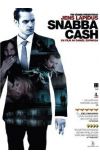
24 Jul 2013 03:23:54
Historically Scandinavia has been shaped by its harsh climate, an innate stoicism, the stern Lutheran branch of Protestantism and two centuries of immigration. The area was among the first to embrace the cinema early in the 20th century and, most especially through Carl Dreyer in Denmark and Victor Sjöström and Ingmar Bergman in Sweden, it has established a tradition of austere moral exploration that is thought to express national character. Lately, however, through the movies, TV and popular literature, the region and its culture have undergone a widely perceived radical transformation.
Just to mention recent movies, the amoral Norwegian thriller based on Jo Nesbø's Headhunters, the film versions of Stieg Larsson's Millennium trilogy about political corruption in Sweden, and Nicolas Winding Refn's three Pusher movies about Copenhagen's criminal underside have exposed something explosive festering beneath the apparently well-ordered world of fairness, fir forests and fjords. This is a new society where brutal action has replaced brooding angst, pieties have given way to pistols, social terror has edged out spiritual torment, angry immigrants filled the spaces deserted by hopeful emigrants.
Easy Money (aka Snabba Cash), adapted by Maria Karlsson from a novel by Jens Lapidus, was actually made in 2010. It proved highly popular in Sweden (there's been a successful sequel and another is in the pipeline) but wasn't released here and is being revived under the aegis of a great admirer, Martin Scorsese. Inevitably after the nouvelle tsunami of Scandinavian cultural crime, it doesn't have quite the impact it would have had four years ago. But it packs a considerable punch, beginning with Jorge (Matias Padin Varela), a bearded Chilean criminal escaping from jail and running through the woods to meet his accomplice. It doesn't slacken for two hours until the same man is again running for his life through the forest, and another man is nursing his wounds in jail. Essentially the film is about three men involved in crime who have retained some vestiges of conscience. They inhabit an immoral world which the representatives of the law appear to be treating with caution. Almost the only time cops come on the scene is in response to a tip-off from a crime boss. This suspicion of official timidity the film arouses is currently being encouraged by the apparent failure of the police to deal decisively with the recent riots in Stockholm suburbs.
The first of these men of vague principle is Jorge, a would-be creator of a new cocaine ring in collaboration with a gang of eastern European Muslims. His sister is expecting a baby by a treacherous Swede, and his expectation of becoming a protective uncle gives him a sense of responsibility. The second man battling with his conscience is the Serbian hitman Mrado (Dragomir Mrsic), who's more or less compelled by the state authorities to care for the eight-year-old Lovisa, his daughter by a drug addict incapable of dealing with her. The third man with certain qualms is the film's only Swede among this gathering of mutually distrustful immigrants, a complex figure with orthodox social ambitions and identity problems. He is Johan Westlund, known as "JW" (Joel Kinnaman), a handsome undergraduate at a Stockholm business school with a troubling resemblance to a taller, younger Martin Amis. We first see him in a lecture room where a professor is explaining that "crisis" and "opportunity" are the same word in Chinese, an ambiguity he takes to heart.
JW, it transpires, is from a working-class family from Kiruna up north inside the Arctic Circle, his father a drunken saw-mill worker, his mother a clerk in an employment agency, and he's passing himself off as the son of a diplomat to become part of Stockholm's rich smart set. To finance his new lifestyle (his wall is plastered with photos of male models he admires) JW moonlights as a driver for an illegal taxi service owned by Arabs associated with Jorge. Paid to tail Jorge, he takes part in an exciting pursuit that culminates in him saving Jorge's life from Mrado and another assassin. This provides him with an entrée into the big money, as he uses his newfound professional expertise to bring together a failing bank owned by the father of an aristocratic social friend with his Muslim associates who seek money launderers. But with a major drug war between Serbs and Muslims on the horizon, JW realises he's getting in over his head, not knowing whom he can trust, and how far, and not being certain which if any of the doors marked "exit" isn't locked.
With pounding synthesised music on the soundtrack, Easy Money moves like a razor-edged Frisbee that could cut off a player's hand or sever his jugular if he doesn't see what's coming. Whether intentionally or not, we're often as confused (both morally and strategically) by a plot that switches between four or five languages as JW himself. There are tense gangland meetings, ambiguous encounters, shoot-outs, and a finale in which everyone appears to be double-crossing somebody else. JW, very well played by Westlund, is a sad, weak victim of an established society that in its own way is as bad, and arguably a good deal worse, than the hard-scrabble immigrants whose presence they ignore but whose cocaine they buy and happily consume.

